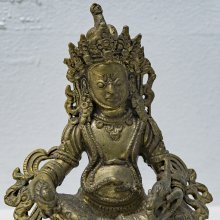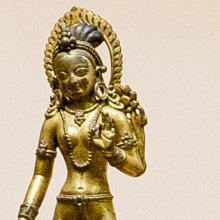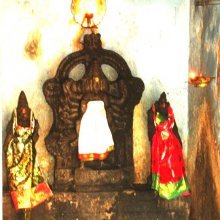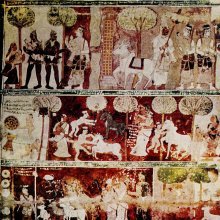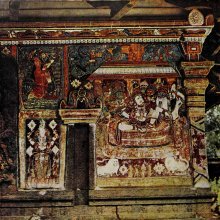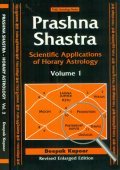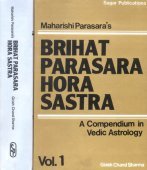Wealth: 3 definitions
Introduction:
Wealth means something in Hinduism, Sanskrit, Jainism, Prakrit. If you want to know the exact meaning, history, etymology or English translation of this term then check out the descriptions on this page. Add your comment or reference to a book if you want to contribute to this summary article.
Images (photo gallery)
(+14 more images available)
In Hinduism
Pancaratra (worship of Nārāyaṇa)
Source: archive.org: Catalogue of Pancaratra Agama TextsThose seeking “Wealth” are advised to worship icons of Dhanada, as discussed in the twenty-eighth chapter of the Naradiya-Samhita: a Pancaratra document comprising over 3000 verses in 30 chapters presenting in a narrative framework the teachings of Narada to Gautama, dealing primarily with modes of worship and festivals.—Description of the chapter [sarvadevatā-sthāpanavidhi]: Nārada describes the worship appropriate to each god for specified ends: [e.g., Dhanada for wealth (29-33а)] [...]. In discussing next the shrine dedicated to each, he describes their shapes, proportions, the building materials used, the types and postures of the icons contained therein, [...].

Pancaratra (पाञ्चरात्र, pāñcarātra) represents a tradition of Hinduism where Narayana is revered and worshipped. Closeley related to Vaishnavism, the Pancaratra literature includes various Agamas and tantras incorporating many Vaishnava philosophies.
Jyotisha (astronomy and astrology)
Source: Journal of South Asian Intellectual History: Samarasiṃha and the Early Transmission of Tājika AstrologyWealth refers to one the “thirty-two astrological lots” (sahamas), as discussed in the fourth chapter of the Karmaprakāśa—one of the earliest preserved Sanskrit works on Perso-Arabic (Tājika) astrology authored by Samarasiṃha in the 13th century.—The so-called lots (Sanskrit: sahamas; Arabic: sahm, translating κλῆρος) are derived by measuring the longitudinal distance between two predefined points in a horoscope (typically two planets) and projecting it from a third point (typically the ascendant degree). Of these 32 lots [e.g., Wealth], all but two are present in what has become the most widespread list of Tājika sahamas, compiled some three centuries later by Nīlakaṇṭha and comprising 50 items.

Jyotisha (ज्योतिष, jyotiṣa or jyotish) refers to ‘astronomy’ or “Vedic astrology” and represents the fifth of the six Vedangas (additional sciences to be studied along with the Vedas). Jyotisha concerns itself with the study and prediction of the movements of celestial bodies, in order to calculate the auspicious time for rituals and ceremonies.
In Jainism
General definition (in Jainism)
Source: The University of Sydney: A study of the Twelve ReflectionsWealth is easy to find (as opposed to Wisdom), as discussed in Bhūdhardās’s composition dealing with the twelve reflections (bhāvanā or anuprekṣā), also found in the Tattvārtha-sūtra.—Accordingly, “[...] [eliminating karma]—Follow the five great vows as well as the five mindfulnesses. Conquer the five powerful sense-organs and establish yourself firmly in elimination. (10) [the world]—The Cosmic Man stands fourteen rājus tall. Within him countless souls wander without knowledge. (11) [wisdom is difficult to obtain]—Wealth, prosperity, gold, the pleasures of power—all these are easy to find. What is difficult to get in saṃsāra is the single knowledge that is appropriate. (12) [...]”.

Jainism is an Indian religion of Dharma whose doctrine revolves around harmlessness (ahimsa) towards every living being. The two major branches (Digambara and Svetambara) of Jainism stimulate self-control (or, shramana, ‘self-reliance’) and spiritual development through a path of peace for the soul to progess to the ultimate goal.
See also (Relevant definitions)
Query error!
Full-text (+3218): Dhana, Artha, Vitta, Vibhava, Lakshmi, Kubera, Dravina, Sampad, Dravya, Vasu, Dhanamada, Svapateya, Riddhi, Arthakama, Dhanasa, Paradhana, Riktha, Sampatti, Dhanada, Vaibhava.
Relevant text
Search found 513 books and stories containing Wealth, The wealth; (plurals include: Wealths, The wealths). You can also click to the full overview containing English textual excerpts. Below are direct links for the most relevant articles:
Rig Veda (translation and commentary) (by H. H. Wilson)
Artha and Arthasastra in the Puranic Iconography < [Purana, Volume 9, Part 2 (1967)]
Padmini-Vidya < [Purana, Volume 1, Part 2 (1960)]
The Seven-Sea gift in the Matsya-purana < [Purana, Volume 1, Part 2 (1960)]
Laghu-yoga-vasistha (by K. Narayanasvami Aiyar)
Part 4 - The Story of Aindhava the son of Indhu or the Moon < [Chapter III - Utpatti-prakaraṇa]
Part 3 - The Story of Bhīma, Bhāsa and Dṛḍha < [Chapter IV - Sthiti-prakaraṇa]
Part 3 - The Story of the Great Bali < [Chapter V - Upaṣānti-prakaraṇa]
Amarakoshodghatana of Kshirasvamin (study) (by A. Yamuna Devi)
Buddhism and Buddhist philosophy < [Chapter 4 - Cultural Aspects]
Fauna (5): Domesticated animals (c): Large bull < [Chapter 5 - Aspects of Nature]
Politics and Administration (5): Law and Administration < [Chapter 3 - Social Aspects]
Panchatantra: A reflex of Arthashastra (by M. N. Indrani)
The concept of Kosa (Treasury) < [Chapter 4 - Arthashastra and Panchatantra—a comparison]
Summary of Chapter 2—Mitrasamprapti (Aquisition of Friends) < [Chapter 3 - Contents of the Panchatantra]
Mahabharata (English) (by Kisari Mohan Ganguli)
Section CXXXVI < [Apaddharmanusasana Parva]
Section LXIII < [Anugita Parva]
Section VIII < [Rajadharmanusasana Parva]
Related products
(+9 more products available)
